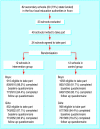Improving teenagers' knowledge of emergency contraception: cluster randomised controlled trial of a teacher led intervention
- PMID: 12016180
- PMCID: PMC111106
- DOI: 10.1136/bmj.324.7347.1179
Improving teenagers' knowledge of emergency contraception: cluster randomised controlled trial of a teacher led intervention
Abstract
Objective: To assess the effectiveness of a teacher led intervention to improve teenagers' knowledge about emergency contraception.
Design: Cluster randomised controlled trial.
Setting: 24 mixed sex, state secondary schools in Avon, south west England.
Participants: 1974 boys and 1820 girls in year 10 (14-15 year olds).
Intervention: Teachers gave a single lesson on emergency contraception to year 10 pupils. The teachers had previously received in-service training on giving the lesson. The pupils were actively involved during the lesson.
Main outcome measures: Questionnaires distributed to pupils at baseline and six months after the intervention assessed their knowledge of the correct time limits for hormonal emergency contraception and for use of the intrauterine device as emergency contraception, the proportion of pupils who were not virgins, the proportion who had used emergency contraception, and the pupils' intention to use emergency contraception in the future.
Results: The proportion of pupils knowing the correct time limits for both types of emergency contraception was significantly higher in the intervention group than in the control group at six months' follow up (hormonal contraception: proportion of boys 15.9% higher (95% confidence interval 6.5% to 25.3%), girls 20.4% (10.4% to 30.4%); intrauterine device used as emergency contraception: boys 4.2% (0.7% to 7.7%), girls 10.7% (0.4% to 21.0%). The number of pupils needed to be taught for one more pupil to know the correct time limits was six for boys and five for girls. The intervention and control groups did not differ in the proportion of pupils who were not virgins, in the proportion who had used emergency contraception, and in the proportion intending to use emergency contraception in the future.
Conclusions: The intervention significantly improved the proportion of boys and girls knowing the correct time limits for both types of emergency contraception. The intervention did not change the pupils' sexual activity or use of emergency contraception.
Figures
Comment in
-
Improving teenagers' knowledge of emergency contraception: Cluster randomized controlled trial of a teacher-led intervention.J Pediatr. 2002 Nov;141(5):740. J Pediatr. 2002. PMID: 12448435 No abstract available.
References
-
- Wellings K, Field J, Johnson A, Wadsworth J. Sexual behaviour in Britain. Harmondsworth: Penguin; 1994.
-
- Social Exclusion Unit. Teenage pregnancy. London: HMSO; 1999.
-
- McEwan J, Wadsworth J, Johnson AM, Wellings K, Field J. Changes in the use of contraceptive methods in England and Wales over two decades: Margaret Bone's surveys and the national survey of sexual attitudes and lifestyles. Br J Fam Plann. 1997;23:5–8.
-
- Vasilakis C, Jick S, Jick H. The risk of venous thromboembolism in users of postcoital contraceptive pills. Contraception. 1999;59:79–83. - PubMed
-
- Task Force on Postovulatory Methods of Fertility Regulation. Randomised controlled trial of levonorgestrel versus the Yuzpe regimen of combined oral contraceptives for emergency contraception. Lancet. 1998;352:428–433. - PubMed
Publication types
MeSH terms
Substances
LinkOut - more resources
Full Text Sources

